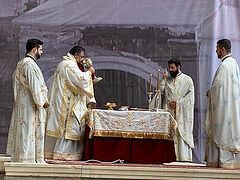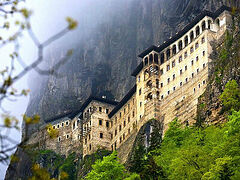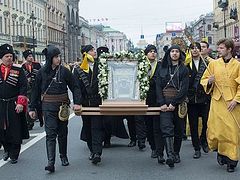Trabzon, Turkey, February 7, 2022
 Panagia Sumela Monastery. Photo: greeks.am
Panagia Sumela Monastery. Photo: greeks.am
Orthodox Christians are outraged at a new advertisement that shows the famous Panagia Sumela Monastery in Turkey being used as a dance club.
A clip from the making of the ad shows a DJ playing loud electronic music in the monastery courtyard with people dancing. The same courtyard is the site of the Divine Liturgy celebrated annually on the feast of the Dormition.
The makers of the clip say the ad, intended to promote the monastery as a tourist attraction, was made with permission of the Turkish authorities, according to Greek Reporter.
“Many comments in social media speak of desecration of the historic monastery as along the music, church bells can be heard in the background. Some even demanded explanations from Turkish authorities, as the holy monastery had essentially turned into a nightclub,” the outlet reports.
The monastery, believed to have been built in the 4th century under Emperor St. Theodosius I, is currently a candidate for inclusion as a UNESCO World Heritage site.
Metropolitan Hilarion (Alfeyev), Chairman of the Russian Church’s Department for External Church Relations, offered comments on the sad event:
It was with great concern that we saw the magnificent Hagia Sophia in Istanbul and the Chora Monastery with its famous frescoes deprived of museum status and actually closed for Christians in 2020. These holy sites as museums were places of world pilgrimage and served as a symbol of mutual respect and understanding between the two world religions. At present, these holy sites common to all Christians are de facto inaccessible to them.
Today, religious peace in the country has been frustrated again, as local authorities permitted a disco at the main historic holy site of Pontic Greeks—the Panagia Sumela Monastery in the Trabzon Province. They say it was done to attract tourists. I’m convinced that Russian tourists, who make up the majority in Turkey, would never consent to such a cynical trampling upon a Christian holy site. In Russia, this kind of attitude to a church or a mosque would entail punishment for the offenders. It’s good to see that at least the locals and representatives of the tourist trade are protesting what happened.
At one time, the Russian Orthodox Church had done a lot to make this once glorious monastery accessible to pilgrims and to make it possible to celebrate annual divine services there. We categorically protest the profanation of Orthodox holy sites in Turkey and hope that its state leadership would will turn a blind eye to this outrage, especially in light of the strengthening Russian-Turkish relations.
***
For centuries, the cliff-side monastery in the Black Sea city served as the cradle of Pontian Hellenism. After 88 years of banning access to the site, Turkey reopened it on August 15, 2010, and a new tradition of Patriarch Bartholomew celebrating the monastery’s patronal feast of the Dormition of the Most Holy Theotokos there began. However, the monastery was closed for restoration in February 2016, and the Patriarch was not permitted to serve throughout the restoration process, which mostly addressed the stability of the cliff.
It was reopened in July 2020, and the Divine Liturgy was celebrated again on Dormition that year.
Follow us on Facebook, Twitter, Vkontakte, Telegram, WhatsApp, MeWe, and Gab!




